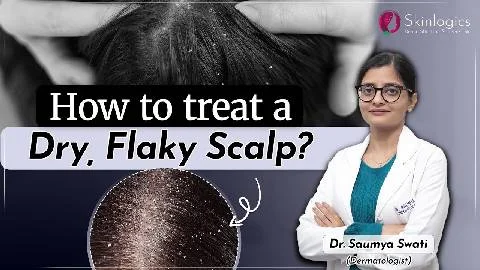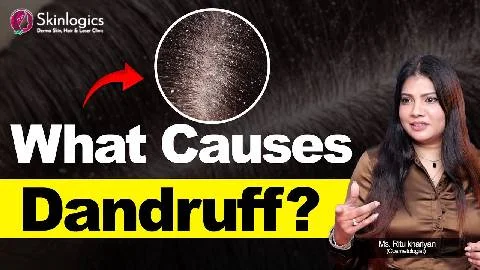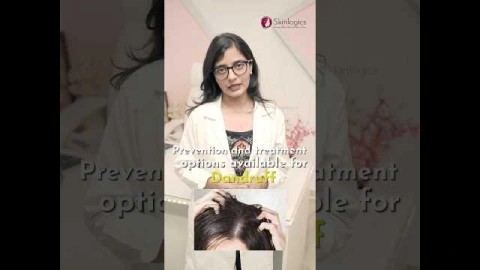Dandruff Treatment in Noida
Dandruff Treatment Cost in Noida ranges from Rs. 1,500 - Rs. 2,000 per session
Our skin constantly undergoes the shedding of its cells as the body to replace older cells by producing new cells naturally. This happens to the scalp skin too. Furthermore, on everyone’s scalp, a single-celled microbe or fungus called Malassezia globosa naturally lives which is known to feed on oils and release oleic acid (unsaturated fat) during the process that can cause skin irritation and inflammation, and can cause excessive dandruff on the scalp. Get effective dandruff treatment in Noida at Skinlogics Clinic. Expert dermatologists offer personalized solutions to control flakes, itchiness, and scalp irritation.
What is dandruff?
Dandruff is a harmless (non-contagious) scalp condition that causes flaky and itchy skin. Some people overlap its definition with Seborrheic Dermatitis which is a chronic form of eczema that can affect any part of the body's skin producing an excess of sebum (natural skin oils). However, dandruff is a common dermatological concern wherein there is excessive shedding of the top skin layer (consisting of dead skin cells) of the scalp, eyebrows, or along the sides of the nose. It is found in both males and females irrespective of their age and ethnicity but most commonly it occurs in adolescence up to midlife when sebaceous glands are most active. It is primarily considered an aesthetic issue that many people find unattractive and feel awkward rather than a medically serious problem. If one is suffering from dandruff issues, they can avail the best dandruff treatments in Noida at Skinlogics.
Indications
Dandruff is characterized by:
- Large white flakes that come loose in the hair to yellow-tinged scales on the scalp.
- Scalp itching.
- Dry or oily scalp skin.
- Shedding of hair at a rate faster than the normal.
The signs of severe cases of dandruff
- Intense itching of the scalp and worsening of the flakes over time.
- Large areas of swelling or redness (erythema) on the scalp.
- Yellow to reddish raised bumps have a scaly appearance along the hairline.
- Persistent symptoms even after using medicated shampoos for a month.
- Extensive hair fall.
What causes dandruff?
According to hair specialist doctors in Noida at Skinlogics, dandruff is a result of rapid maturing and falling of the scalp skin cells precipitated by excess sebum secretion. It is the unusual desquamation of the epidermis that can likely be caused by poor scalp hygiene contributing to the rapid growth of Malassezia furfur and oils build-up. Some causative factors include:
- Microbes An overgrowth of the normally residing fungus (called Malassezia) on the scalp that alters the normal shedding of dead skin cells and produces an excess of saturated fats (aiding in the growth and division of fungal cells) and unsaturated fats (causing skin irritation and inflammation) can result in visible white flakes called dandruff. It can even be caused by a ringworm infection on the scalp. Not only fungus, bacteria such as Propionibacterium acnes and Staphylococcus epidermidis can also lead to dandruff.
- Cold, dry winter season As the air in the cold season is devoid of moisture, the skin of the scalp becomes too dry, thereby triggering dandruff or even worsening it.
- Scalp disorders This includes eczema (like contact dermatitis which is an itchy rash caused by an allergen or irritant) and psoriasis (a chronic inflammatory disease) of the scalp.
- Genetic predisposition Dandruff tends to run in families which suggests there are some genetic markers of dandruff that can make some people vulnerable to it.
- Unhealthy diet Intake of more sugary, salty, and fatty foods or processed foods rich in sugar content and fewer fibers in the diet, promotes the overgrowth of Candida yeast and also causes poor digestion, hence leading to dandruff.
- Hormonal disorders Hormones (such as androgens) play an important role in the secretion of natural oils which keeps the hair and scalp moisturized. However, a hormonal shift can make the skin lose its moisture.
- Frequent hair coloring The chemicals present in hair dyes make the scalp devoid of protective lipids/oils. Thus hair coloring makes the scalp skin exposed and more vulnerable to damage caused by irritants like Malassezia globosa.
Some risk factors
- Stress, fatigue or extreme tiredness.
- Not regular proper brushing of the hair.
- Leaving unattended oily or greasy hair
- Applying harsh shampoos.
- Frequent use of hair styling tools.
- Infrequent shampooing.
- Age - Dandruff often starts at puberty, is at its peak around the 20s, and is less prevalent in people aged above 50 years.
- Weakened immune system - Immunocompromised patients having HIV/AIDS, alcoholic pancreatitis, Hepatitis C, or those having undergone organ transplants.
- Neurologic and psychiatric conditions - The control of sebaceous glands secretion can be affected by neurological conditions like Alzheimer’s disease, Parkinson’s disease, epilepsy, and traumatic brain injury.
How is dandruff diagnosed?
Dandruff is a self-diagnosable condition that anyone can spot by simply looking at the scalp. If it is not treated, then the healthcare provider may perform a skin biopsy to rule out all possible related issues. It may be classified as mild, moderate, or severe after knowing the hair care routine and the symptoms of the scalp skin condition.
Best Treatment options for Dandruff
Gentle OTC shampoo
The patients must regularly wash their hair with a light shampoo by gently massaging the scalp to reduce the oil and skin cell build-up and loosen the flakes.
Prescribed dandruff treatment
If dandruff persists even after using over-the-counter shampoos for several weeks, then the patient can go for a prescribed anti-dandruff shampoo. This includes ketoconazole-based shampoos that are antifungals; topical corticosteroid lotions; or calcineurin that works by suppressing the immune system.
OTC anti-dandruff/ anti-fungal shampoo
For mild to moderate cases of dandruff, the patient must try to alternate between two to three medicated shampoos for a few weeks. While purchasing the anti-dandruff shampoos at the drugstore one must look for the following ingredients:
- Selen-ium sulf-ide It reduces the natural oil production on the scalp and even has antifungal properties.
- Pyr-ithione zinc It can help slow down the growth of yeast on the scalp. It is a combo of antifungals and antibiotics.
- Ketoco-nazole It is an antifungal agent that can work for any age.
- Coal tar It is a natural substance having both antifungal and antibiotic properties. But it must be used in low concentrations as it can be carcinogenic. Moreover, its long-term usage can stain the dyed or treated hair and even make the scalp sensitive to sunlight.
- Salicylic acid It helps slough away the excess skin cells that appear as white flakes and also promotes healthier skin.
- Tea tree oil It is a natural ingredient found in many shampoos (in about 5%) and known for its antifungal and antibacterial properties.
To know the dandruff treatment cost, please feel free to visit Skinlogics.
Dandruff Treatment Cost in Noida
Dandruff Treatment Cost in Noida ranges from Rs. 1,500 - Rs. 2,000 per session
The cost of dandruff treatment in Noida ranges from Rs. 1,500 to Rs. 2,000 per session, depending on the severity of the condition, the type of treatment used, and the clinic’s reputation.
Key Factors Influencing Dandruff Treatment Cost:
- Severity and type of dandruff or scalp condition
- Treatment method (e.g., scalp peels, ozone therapy, medicated shampoos)
- Number of sessions needed
- Clinic reputation and location
- Dermatologist's expertise



